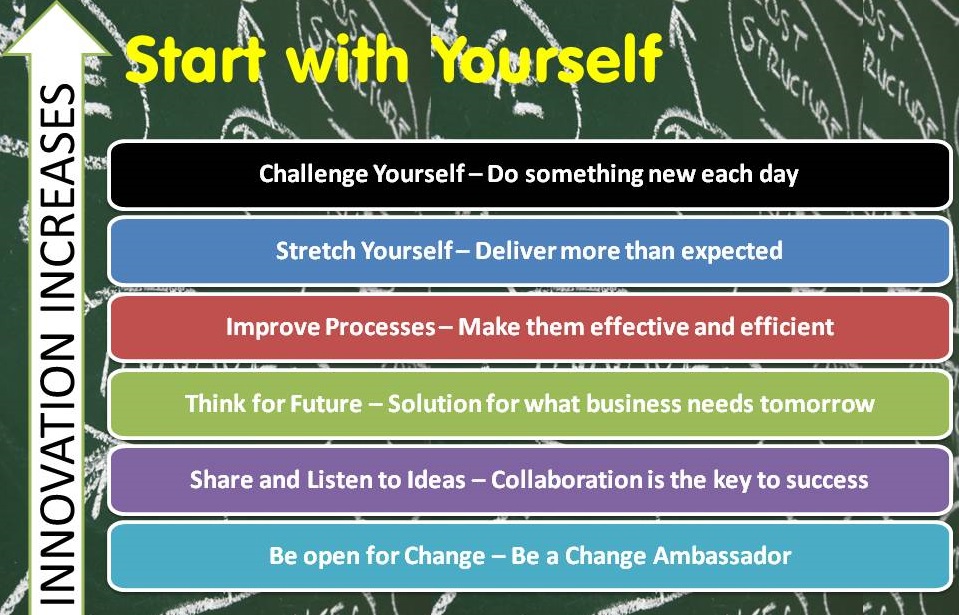- Home
- Business Processes
- Industry Knowledge
- Aerospace Industry
- Automotive Industry
- Banking Domain
- BFSI Industry
- Consumer/ FMCG Industry
- Chemicals Industry
- Engineering & Construction
- Energy Industry
- Education Domain
- Finance Domain
- Hospitality Domain
- Healthcare Industry
- Insurance Domain
- Retail Industry
- Travel and Tourism Domain
- Telecom Industry
- Leadership Skills
- eLearning
- Home
- Leadership
- Change Management
- Handling Change & Innovation
Handling Change & Innovation
At times like this, more than ever, it is essential that the organizations appreciate the human resource management skills required to successfully handle the transformation of industry and create an innovation culture. Read more to understand, how as a manager you can help in cultivating a culture of continuous innovation and adaptation to change.
'The times they are changing', and 'more's the pity' perhaps you say.
It is often said that change is the only reality, rest is subject to change. History has time and again proven that the process of change is inevitable in the progress of mankind. The ability of the human race to innovate has brought about the radical transformation of society. Change- it's the one aspect of life that never seems to change. It happens all the time. The only thing is that there seems to be more of it and it happens more and more quickly.
Developing the Innovation & Change Mindset
When we talk about innovation, everyone thinks about imagination breakthroughs, ideas that are game changers. But practically it is nearly impossible to generate great ideas everyday. But innovation is a culture and you can cultivate the same. Whatsoever your job may be, you can always innovate and bring change in your current job. There is no stability nowadays. It is really meant that change is at the very heart of life. Think about it for a moment, independent of business as such, and look at the role of change in general. You could say that life is change.
Management means risking yourself in the mobilization of resources and relationships to add value to the enterprise. So, as a manager, you are almost abounding to participate in the processes of change in the enterprise for which you work. In your company, you may feel that you have little chance to influence the process of change. All the decisions are taken at the very top and what the chief executive says is final. So the change decisions are handed down and you have to get on with handling and implementing them. But surely you will still have an effect on how the company or enterprise performs in the implementation of change.
Everyone in any enterprise is involved in change in some way or another, and its success or failure depends on everyone. The ideal company may well consult a large number of its employees about decisions concerning change what to change, how to change, and when to change. It does, its employees will have a sense of ownership in the changes and are more likely to co-operate in their implementation. Of course, there are, in even the most participative of companies, situations where there is no time to consult everybody or where secrecy is of the essence such as in some merger or acquisition decisions. And some companies are just autocratic anyway.
But whatever the situation, at all levels every manager has some contribution to make to the process of change, and to make that contribution requires a certain attitude of mind a certain mindset. To identify this mindset, and to assist its growth in the readers and indeed in the enterprise for which they work. The following imperatives will help you make a positive change to your workspace every day and make innovation your way of life.
Challenge Yourself:
Every time you make a decision you risk yourself. You chop off one branch of a tree in favor of another. That is the meaning of the word 'decide', from the Latin decidere, meaning to cut off. It is a risky business because you cannot easily stick back the branch you have chopped off.
Innovation must be nurtured at each level in the organization and most of all, by each person, deep within himself. Challenge yourself and ask yourself if you wanted to improve the environment for innovation, what specifically you can do in your current job to cultivate that culture? You might struggle with these questions in the beginning but so you will find that you yourself have an inner source that is capable of generating so many small and big ideas but just waiting to be challenged. Start challenging yourself to do something new each day.

Stretch Yourself:
Career Growth is all about pushing the limits of your current position. It's about showing that you have outgrown your current responsibilities and that you have the capability to not only handle your current responsibilities but also to deliver something innovative which no one was expecting from you. This attitude proves to the leaders that you are ready to take on newly expanded roles. Going beyond what's expected, and stretching yourself beyond your current role by delivering more than expected can lead to a new job with more responsibilities.
Improve Processes & Add Value:
Add value to the Enterprise. We could have said profit, and often this is what we mean. But we can be in the voluntary of the public sector where the community has to be served, effectively and economically, but where it has been decided by the government or people or both that the activity must be run outside the normal market mechanism of shareholders and stock markets. Similarly, we are not saying 'organization' or 'firm' or 'business' or 'company'. All these would be perfectly appropriate, but we wanted a word that would have a forceful, thrusting, innovative, creative, exciting flavor, and enterprise seems to capture that approach.
Innovation is not just about coming up with a new great idea. Finding innovative solutions to improve current processes to bring cost-effectiveness, improve efficiency, and make them effective is a form of innovation that you can control. There are opportunities in every role to improve what is happening today. Start with your current role. Make sure the next code you write is better than all earlier ones. Ensure you are leaning the processes under your control and eliminating wastage. Innovation can happen in small things as well and they need not keep waiting for a big idea to happen. Focus on coming up with innovative ways to do current things better.
Think for the Future:
Understand the big picture, and incorporate it into your day to day decisions and solutions. Always think for the long term, think for the Future. Solution for what business needs tomorrow. Connect your job with the big picture and make sure you are building your solutions and processes that are sustainable and scalable in the future as the need arises.
Share Ideas to Mobilize Resources:
Nothing happens without resources; there are never enough of them and they won't always readily provide the advantage that you seek. So there are people, materials, money, markets, ideas, components, space and time, and many other resources all requiring to be mobilized before you can produce and sell what you have to offer. The word 'mobilize' has a very active ring about it, and management is about the activity. Don’t be afraid. Learn to deal with your fear. Put forward your ideas, even if you aren't sure of its success and how people are going to respond. Be prepared for many of your ideas to not be accepted and always encourage your peers and followers to share their ideas.
Mobilizing resources would only take you so far unless you got the relationship right, especially those of people. People meant workforce, suppliers, customers, shareholders, government, community- all the stakeholders. They had to be given a sense of shared ownership for what was going on - and managers are the prime influences of this process. They are people-linkers.
Be Adaptive:
Traditionally and universally it is believed that people resist change due to its displacing effect overtime. However, people move towards their acceptance through negotiations over the 'price' of change. Innovation always involves risk. Innovation always brings change. Are you adaptive to change? Do you embrace change or resist it. Be willing to change and help others accept change.
Related Links
Explore Our Free Training Articles or
Sign Up to Start With Our eLearning Courses

About Us
Learning
© 2023 TechnoFunc, All Rights Reserved
